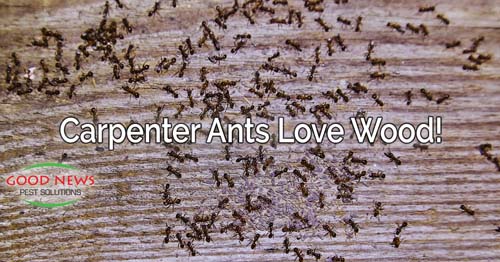
Carpenter Ants - the Other Wood-Muncher!
Of all the ants you could find in your home, Carpenter Ants seem like they could be the most pleasant. They cut and measure and put things together, build furniture, maybe do a little woodworking on the side…
Sorry to say, that image is NOT the reason Carpenter Ants got their name. They can’t build you a deck, help you with your IKEA assembly or finish that over-the-garage apartment. In fact, they should probably be called “Excavator Ants,” because that’s a better description of what they do.
That’s a Mouthful
Camponotus pennsylvanicus, or Black Carpenter Ants, were discovered in 1773, and were the first ants known to be native to North America, although other variations of carpenter ants live around the world.
They are often mistaken for winged termites, which makes some sense, since they both are found around wood. Unlike the termite, though, carpenter ants will chew wood, but only to dig it out of existing holes to make room for their nest. Carpenter ants don’t eat the wood, but prefer sweet snacks, pet food, meats, and occasionally, other insects.
Though there’s still some debate on the matter, most experts believe that carpenter ants start with already rotted or decaying wood, and merely expand the existing holes to make room for their nests. They are rarely found in brand new or recently treated wood.
In their natural habitat, they nest in damp tree stumps and rotted wood in the forest. But as we continue to encroach on their world, carpenter ants, like many other insects, return the favor in our homes.
I Spy…
Carpenter ants have large mandibles that open horizontally, like scissors, and their antennae are elbow-shaped. Florida carpenter ants have black abdomens with reddish-brown thoraxes and heads and are some of the largest ants in the world.
They range in size from 5-10 millimeters, except for the winged variety, which are about ¾ of an inch long. In late spring to early summer, the winged ants mate in the air. The female will thereafter shed her wings and seek cracks in any wood – although she prefers moist wood – and she will settle down to start her new colony.
After her first brood is mature, between 6 to 12 weeks, the queen settles down and just lays eggs while the first generation cares for subsequent descendants. Because of our sub-tropical weather, the ants seldom hibernate, so the colonies can grow quicker in Florida.
After about 2 years, the queen begins producing winged offspring that leave the nest and begin the process again.
Life In a House
Spotting carpenter ant workers in your house is usually the best sign that you may have a problem. Sometimes you’ll hear faint rustling noises inside woodwork or walls if the colony is growing. Also watch for piles of wood, very similar to the contents of an old school pencil sharpener.
Carpenter ants clean and polish their nesting areas or galleries. Subterranean termites, on the other hand, often track dirt and mud into their “homes.” Carpenter ants will also leave little portholes in the wood, where they can toss their excess debris. While drywood termites also dump their leavings, they mix it with their droppings that are uniform in size.
If you’re finding piles of debris, or hearing a hollow echo when you tap on the walls or baseboards in your home, it’s best to assume the worst and call a pest control specialist.
Here at Good News Pest Solutions, our highly trained field associates can inspect your home and identify right away whether you have ants or termites and recommend the proper treatment.
The good news is there are also preventative measures. Our most popular service is our Go Green Pest Control, that treats your whole house at least three times a year to keep out the most common insects here in Florida, including the black and red carpenter ants. All of our treatments are risk-reduced, ensuring your family's safety. To find out more and schedule your first visit, just give us a call!
« Back to BlogProudly Serving
Sun City Center, Ruskin, Palmetto, Parrish, Ellenton, Bradenton, Anna Maria, Holmes Beach, Bradenton Beach, Longboat Key, Lakewood Ranch, University Park, Myakka City, Sarasota, Siesta Key, Osprey, Nokomis, Casey Key, Venice, Englewood, North Port, Port Charlotte, Punta Gorda, Arcadia
Things You Can Do
Pay Your Bill Online
Leave Us a Review
Request a Free* Termite Inspection
Stop Mosquito Bites
Get Rid of Rodents
Get a Termite Damage Warranty
Get Pest Control for Your Attic
Get Pest Control for Your Business Request Prayer
Corporate Address
1080 Enterprise Court, Ste A
North Venice, FL 34275
Call Now: (941) 412-9610
Text: (941) 412-9610
Fax: (941) 412-0080
